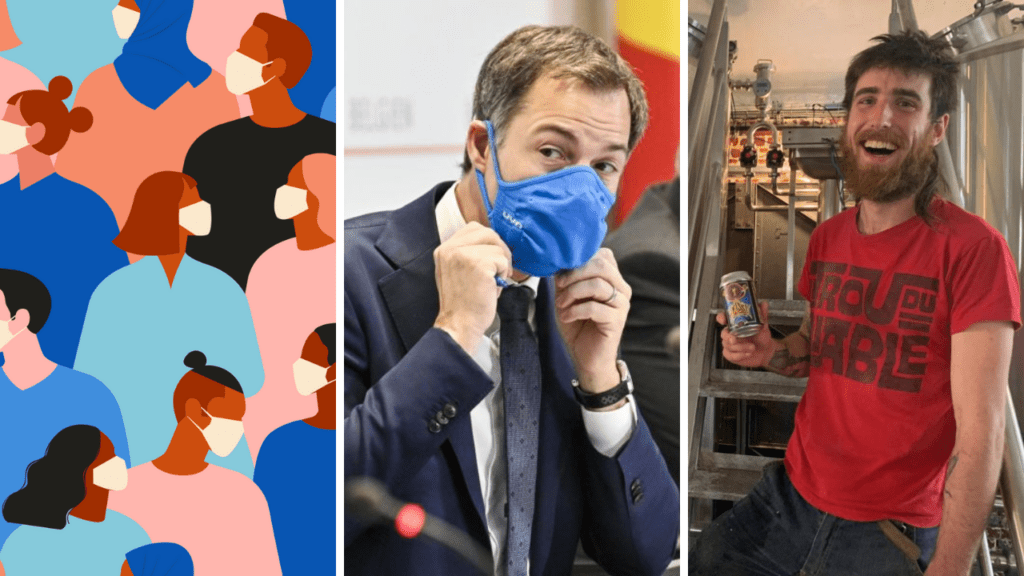Another Friday, another Consultative Committee meeting.
After a brief break in their not-really-fixed schedule last Wednesday, the ministers of Belgium's different governments are meeting again today to iron out the folds they didn't get to last time.
That meeting, which started at 9:00 AM and lasted roughly seven hours, resulted in Prime Minister Alexander De Croo announcing that terraces could possibly/hopefully/maybe reopen from 8 May.
How that would happen, however, wasn't entirely clear yet, leaving mayors, bar owners, police zones and people who just want to do something else than go for another walk confused and slightly worried.
Details on mandatory closing times, the number of people per table, the number of people per terrace and face masks are all expected to be discussed today.
The closing time especially seems to be food for thought today, with three options seemingly on the table: 8:00 PM, 9:30 PM and 11:00 PM - each with their own pros and cons.
Mayors and police argue that shutting bars too early will lead to people taking their now-unsupervised gatherings elsewhere, while the hospitality sector fears that too strict of measures will render the restart unprofitable.
What do you think? Is 11:00 PM a better closing time than 8:00 PM? Or the other way around? Another hour entirely?
Let @johnstonjules know (or @maithechini, as she wrote it today).
BUT WAIT, one last thing: Want news from The Brussels Times in your inbox every morning? Sign up for The Recap, a free daily newsletter containing all the stories you need to know from the day before. It goes great with your morning coffee.
Belgium in Brief is a free daily roundup of the top stories to get you through your lunch break conversations. To receive it straight to your inbox every day, sign up below:
1. What Belgium’s Consultative Committee is discussing today
Belgium’s Consultative Committee will meet again today, not to discuss new restrictions or relaxations, but to work out how its previous decisions will be put into practice.
The Committee will meet in person from 3:00 PM, and a press conference will be held afterwards, the cabinet of Prime Minister Alexander De Croo confirmed to The Brussels Times. Read more.
2. Europe’s problem with toxic masks: ‘Does von der Leyen even know what she has been inhaling?’

Weeks after they were banned in Canada for containing dangerous nanoparticles that caused respiratory problems in schoolchildren, allegedly toxic face masks have flooded the European market and are even being worn by top EU officials.
“Masks are an essential first line of defence, both against the virus and for a lot of professions and professionals who are exposed to toxicants in the air as part of their work,” David Azoulay, Director of Environmental Health at the Center for International Environmental Law (CIEL), told The Brussels Times. Read more.
3. New advice: pregnant women should get priority vaccination
Contrary to its previous advice, Belgium’s Superior Health Council now recommends that all pregnant women should be vaccinated against the coronavirus as a matter of priority.
Based on the latest scientific evidence and recommendations, the Council – which is the scientific advisory body of the government – states that pregnant women have an increased risk of severe Covid-19, and of preterm delivery. Read More.
4. Beer in the front, party in the back: Schaerbeek gets a new brewery

Brussels’ Schaerbeek, nicknamed “the city of donkeys,” has made way for La Mule with the opening of a new brewery, in spite of – or perhaps because of – the global pandemic that’s all but completely shut down the service sector. Read more.
5. Constitutional Court throws out data retention law
The Constitutional Court of Belgium yesterday declared the so-called data retention law unconstitutional, a decision which threw police, investigating magistrates and prosecutors into turmoil.
Put briefly, the data retention law obliges all telecommunications companies to keep details of every transaction that takes place through their system for one year, just in case the authorities should later need to consult the data in the course of an investigation. Read More.
6. Brussels launches initiative for cheaper energy bills
The Brussels government on Thursday announced a new initiative that aims to lower the energy bills of the city’s inhabitants by optimising the renovations of buildings in the city to make them more sustainable.
The renovation strategy (RENOLUTION), which will be supported by €350 million in funding between now and 2024, will rely on the construction, the financial, and the association sectors as well as social partners to implement effective solutions. Read More.
7. Diesel and petrol powered cars decline in Belgium, the EU
Vehicles with traditional engines are being outpaced by hybrid and electric cars in Belgium and across Europe, according to figures released Friday by carmakers.
Diesel cars accounted for just 23.2% of auto registrations in Europe in the first quarter, down from nearly 30% in early 2020. Read More.
Maïthé Chini
The Brussels Times

